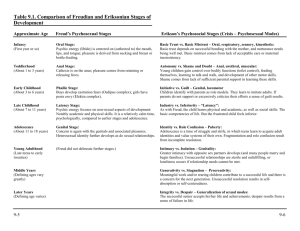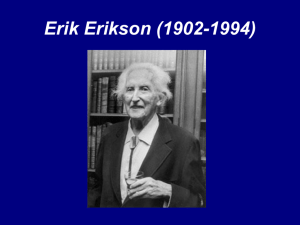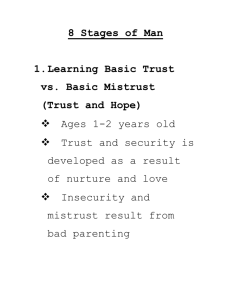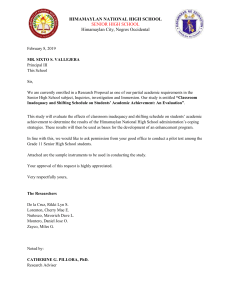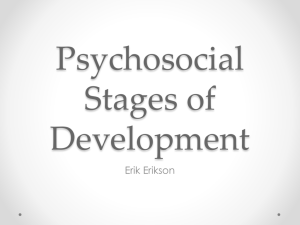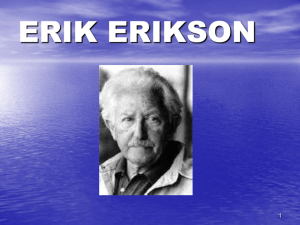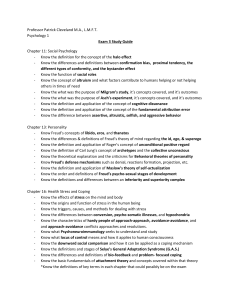Personality
advertisement
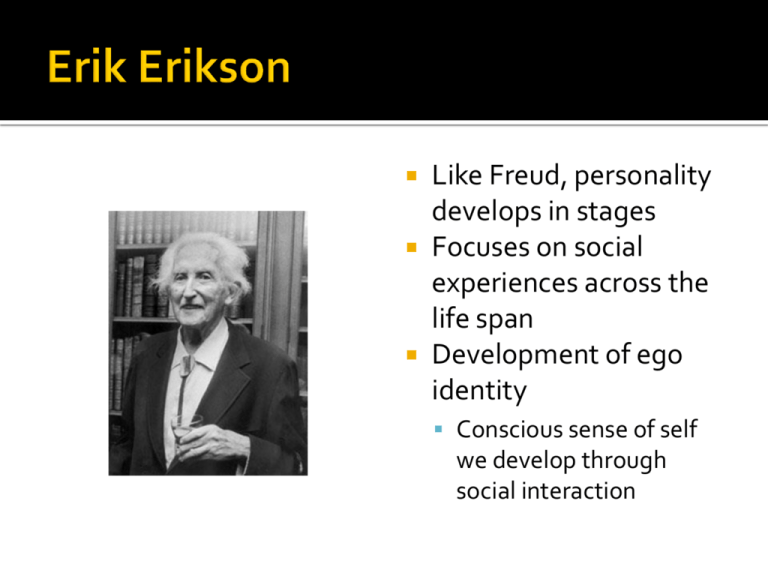
Like Freud, personality develops in stages Focuses on social experiences across the life span Development of ego identity Conscious sense of self we develop through social interaction Each stage is concerned with being competent in an area Handle well=mastery Handle poorly = inadequacy Each stage has a conflict that serves as a turning point in development Develop a psychological quality or failing to develop that quality Potential for growth and failure is high Born in Germany in 1902. In grammar school, he was teased for being Jewish. He did not feel comfortable (at a very early age) as a German or a Jew. This feeling was a basis for his later theory of “identity crisis” In 1920’s, he met Sigmund Freud’s daughter (Anna) and studied under her in Vienna. Moved to U.S. in 1933 and taught at Yale, Harvard, and UCal at Berkeley. Trust vs. Mistrust Autonomy vs. Shame and Doubt Initiative vs. Guilt Industry vs. Inferiority Identity vs. Confusion Intimacy vs. Isolation Generativity vs. Stagnation Integrity vs. Despair Fundamental stage Infants are dependent: need to develop trust Based on dependability & quality of caregivers If develops trust: safe and secure Failure: fear and a belief that the world is inconsistent and unpredictable Focused on children developing a greater sense of personal control Toilet training was a vital part of process Learning to control one’s body function leads to sense of control and independence Control over food, toys, and clothes Success: secure and confident Failure: inadequacy and selfdoubt Build self-esteem and autonomy as we gain control Develop will Children begin to assert their power and control Play and social interaction Successful: capable and able to lead others Failure: sense of guilt, self-doubt, and lack of initiative Through social interactions: sense of pride in accomplishments and abilities Encouraged and commended by parents and teachers: develop a feeling of competence and belief in their skills Little or no encouragement from parents, teachers, and peers: doubt ability to succeed Industry: accomplishing new skills and knowledge Exploring independence, developing sense of self Receive proper encouragement and reinforcement through personal exploration: strong sense of self and a feeling of independence and control Unsure of beliefs and desires= insecure and confused about themselves and future Up to this point: development is based upon what is done to us Here on out is what we do! Social interaction, moral issues Our task is to discover who we are as individuals separate from our family of origin and as members of a wider society. And if we are unsuccessful in navigating this stage, we will experience role confusion and upheaval. A significant task for us is to establish a philosophy of life and in this process we tend to think in terms of ideals, which are conflict free, rather than reality, which is not. The problem is that we don't have much experience and find it easy to substitute ideals for experience. However, we can also develop strong devotion to friends and causes. It is no surprise that our most significant relationships are with peer groups. Seek companions and love Attempt to find mutually satisfying relationships through marriage and friends Start a family Successful: intimacy on a deep level Failure: isolation and distance from others , if no satisfying relationships our world shrinks Continue to build our lives Focus on career and family Success: feel like they are contributing to the world by being active in their home and community Fail: unproductive and uninvolved, self-absorbed and stagnate Creative and meaningful work Children leave home, midlife crisis, new meanings and purposes Much of life is preparing for the middle adulthood stage and the last stage is recovering from it Reflecting back on life Perhaps that is because as older adults we can often look back on our lives with happiness and are content, feeling fulfilled with a deep sense that life has meaning and we've made a contribution to life, a feeling Erikson calls integrity. On the other hand, some adults may reach this stage and despair at their experiences and perceived failures.
